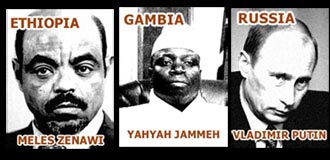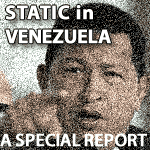|
 For World Press Freedom Day, CPJ spotlights the ‘Backsliders’ For World Press Freedom Day, CPJ spotlights the ‘Backsliders’
Ethiopia, where the government launched a massive crackdown on the private press, leads CPJ’s list of the “Backsliders,” the 10 countries where press freedom has most deteriorated. In issuing its analysis to mark World Press Freedom Day, May 3, CPJ called attention this year to long-term erosion in press conditions. The other countries on the dishonor roll are the Gambia, Russia, the Democratic Republic of Congo, Cuba, Pakistan, Egypt, Azerbaijan, Morocco, and Thailand.
The backsliders reflect a mixture of relatively open countries that have turned increasingly repressive and traditionally restrictive nations where press conditions have worsened. “The behavior of all of these countries is deeply troubling, but the rapid retreats in nations where the media have thrived demonstrate just how easily the fundamental right to press freedom can be taken away,” CPJ Executive Director Joel Simon said.
To learn more about this project, hear an audio report from CPJ Deputy Director Robert Mahoney.
U.N. secretary-general pledges support in meeting with CPJ
|
|
Secretary-General Ban Ki-moon (centre) meets with the Committee to Protect Journalists, at UN Headquarters in New York. (UN/Devra Berkowitz )
|
In an April 27 meeting with a CPJ delegation, U.N. Secretary-General Ban Ki-moon, expressed admiration and promised support for journalists in dangerous situations worldwide. “Tell them we will be behind them,” the secretary-general said. The delegation presented Ban with our annual publication, Attacks on the Press , and raised the pressing issue of impunity in crimes against journalists. The delegation included CPJ board members Norman Pearlstine and Mark Whitaker, along with Simon and Mahoney. U.N. spokeswoman Michele Montas also attended.
Top Reuters editor to be chairman of press freedom awards
Reuters Editor-in-Chief David Schlesinger will be chairman of our 2007 International Press Freedom Awards, CPJ Chairman Paul Steiger announced at an April 23 reception hosted by the news agency in London. “Reuters knows intimately the challenges that face journalists around the world, and it means a lot to us to have David’s leadership at this important event,” Steiger said. Schlesinger and Reuters CEO Tom Glocer hosted the event. Christiane Amanpour, CNN chief international correspondent and CPJ board member, spoke about critical challenges facing today’s journalists.
CPJ welcomes acquittal of eight Ethiopian journalists
Ethiopia’s High Court has acquitted and set free eight editors and publishers of Amharic-language newspapers who had been jailed on antistate charges since a massive November 2005 government crackdown. A CPJ investigation last year had concluded that the charges were groundless . “We welcome the verdict of the High Court and the long overdue release of these journalists,” said Simon. “We urge the High Court to dismiss remaining charges against the other journalists still detained.” At least nine other journalists remain behind bars on similar charges, according to CPJ research. Ethiopia remains Africa’s second leading jailer of journalists, behind only Eritrea.
 Concern in Venezuela; injustice in Mexico Concern in Venezuela; injustice in Mexico
The Venezuelan government failed to conduct a fair and transparent review when it refused to renew the broadcast license of Radio Caracas Televisión, the country’s oldest private broadcaster, CPJ concluded in a new report, “Static in Venezuela,” released on April 24. The report, based on a three-month investigation by CPJ’s Carlos Lauría and Sauro Gonzalez, concludes that the government’s decision was predetermined and politically motivated, setting an alarming precedent and casting doubt on Venezuela’s commitment to free expression. Lauría discussed his findings at a luncheon meeting at CPJ offices the following day; the event featured CPJ board member Victor Navasky, publisher emeritus of The Nation, who participated in our January mission to Caracas.
To learn more about our mission, hear Lauría’s audio report .
Despite photographs, ballistics evidence, and eyewitness statements, the October 2006 killing of American documentary filmmaker Bradley Roland Will in the southern Mexican city of Oaxaca remains unsolved, writes Monica Campbell in a special report, “A Killing in Mexico,” released on April 17. Campbell, a Mexico City journalist who reported for CPJ, recounts the efforts of Will’s family to pressure unresponsive officials and to hold Will’s killers accountable.
See Will’s raw video , taken in the moments before he was shot.
Board members win Pulitzers
Congratulations to Pulitzer Prize-winning CPJ board members and their publications. Gene Roberts was honored for his book, The Race Beat, written withHank Klibanoff, The Wall Street Journal, led by Steiger, won prizes for public service and international reporting. The Oregonian, led by Sandra Mims Rowe, won for breaking news reporting.
CPJ travels to Egypt, Morocco, Mexico
Joel Campagna, senior program coordinator for the Middle East and North Africa, traveled to Egypt April 8-11 to meet with editors and journalists on the alarming surge in press restrictions. The trip followed Campagna’s mission to Morocco, which he discussed at a CPJ luncheon meeting on April 19. Prominent Moroccan publisher Aboubakr Jamai joined in the discussion.
Americas Research Associate María Salazar traveled to Mexico City April 15-18 to participate in a discussion with Latin American members of the International Freedom of Expression Exchange (IFEX). On April 17, Salazar met with Mexico’s recently appointed special prosecutor for crimes against the press, Octavio A. Orellana Wiarco.
Former CPJ executive director Ann Cooper, who heads the broadcast program at the Columbia Graduate School of Journalism, traveled to Moscow on April 11 to investigate the mysterious death of Ivan Safranov, a journalist who died after falling from a fourth-story window on March 2.
Coming
On May 7, CPJ is co-sponsoring an event with the Graduate School of Journalism and the Harriman Institute at Columbia University featuring Aleksei Venediktov, editor-in-chief of the Russian radio station Ekho Moskvy, which has maintained its independent voice despite increasing restrictions on press freedom.
|
 For World Press Freedom Day, CPJ spotlights the ‘Backsliders’
For World Press Freedom Day, CPJ spotlights the ‘Backsliders’